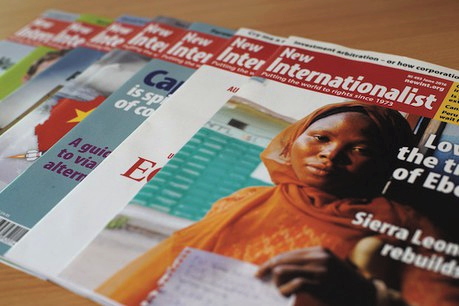While making cars more energy efficient is a worthy goal, it is not enough.
Published in the May 2014 issue of the New Internationalist.
Like many environmentalists, I’ve wanted to see electric cars go mainstream. But not like this.
One of the most talked-about advertisements on US television in recent months has been a promo for the Cadillac ELR. Priced at $75,000, the ELR is no typical gas-guzzling luxury sedan; it’s an electric hybrid, which can travel 55 kilometres on battery alone before needing backup from its gasoline motor.
Interestingly, the car’s bona fide green credentials are downplayed in the now infamous commercial, entitled ‘Poolside’. (Since when do ads have names, anyway?) Instead, the spot devotes itself to celebrating the US work ethic, defending the blasé arrogance of the rich, and mocking other countries.
‘Why do we work so hard? For what? For this? For stuff?’ asks a fictionalized blue-eyed executive as he walks the grounds of his manicured property (swimming pool included). ‘Other countries, they work, they stroll home, they stop by the café, they take August off,’ he notes incredulously. ‘Off!’
This, however, is not the American way, ‘because we’re crazy, driven, hardworking believers,’ he explains. ‘You work hard, you create your own luck, and you gotta believe anything is possible.’
Unplugging his new automobile, he concludes: ‘As for all the stuff, that’s the upside of only taking two weeks off in August. N’est-ce pas?’
The ad, which aired constantly during the recent Winter Olympics, was not universally admired. Hit with criticism that it serves as a smug self-congratulation for the wealthiest one per cent, General Motors spokespeople were compelled to do damage control. You must make $375,000 per year to break into the top percentile, they explained. Yet their message targets those consumers who have a ‘little bit of grit under their fingernails’ and take in just $200,000 annually.
We stand corrected.
While the veteran France-bashers of the American Right have celebrated ‘Poolside’, large swathes of the country have, thankfully, been repelled. One reaction that went viral was a blog post entitled ‘Cadillac Made A Commercial About The American Dream, And It’s A Nightmare’.
The author quoted a YouTube commenter who wrote ‘I’d take more vacation any day over a Cadillac’, then added her own ‘Amen to that’.
Americans, on average, do put in more work hours than their counterparts in Western Europe (although fewer than workers in South Korea or the Czech Republic). For most, it’s hardly a matter of choice. The fastest-growing US job classifications, such as home-health aide, pay scarcely more than poverty wages. Those with middle-class positions have been expected to take on the work of colleagues fired in the recession. Meanwhile, the benefits of productivity gains in the past 10 years have gone almost exclusively to the top one per cent.
Despite its flaws, the Cadillac ad has some unintentional strengths. By not highlighting the environmentalist virtues of the car and instead going for a more business-oriented appeal, it illustrates the paradox of green consumerism in a way that a typical electric car promotion would not: in one tidy pitch we see the energy-efficient technology that is supposed to save the planet, hand in hand with the materialism and market triumphalism that are killing it.
We see that, while making cars more energy efficient is a worthy goal, it is not enough. Seriously addressing the challenges of climate change and environmental destruction will require us to break the stranglehold of GDP as the sole measure of human progress.
This means going beyond demands for more jobs and better pay as the economy improves. It means reviving the labour movement’s historic push for more humane working hours for all people, since, as economist Juliet Schor writes, ‘Households that are time stressed live in more carbon-intensive ways.’
While it may produce less profit for the electric-car industry than Poolside’s lifestyle prescriptions, the true recipe for a more sustainable world would be to allow people a different option: Work less. Vacation more. Buy no Cadillacs.
